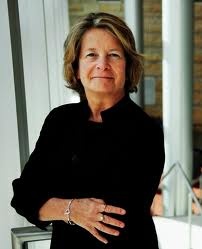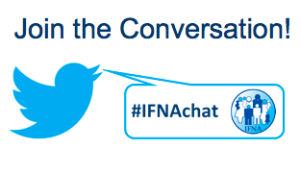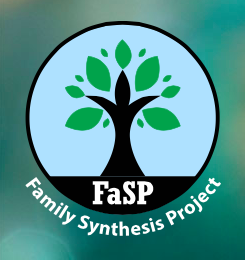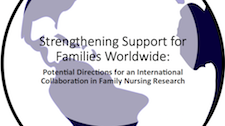Dr. Patricia Young and Dr. Norma Krumwiede, who are faculty members at Minnesota State University, Mankato (USA), created as a family nursing teaching resource the Family Construct Poster Presentation Assignment. This assignment is designed for first semester undergraduate nursing students and can be edited to combine any topic with a family construct for students to explore the literature further and demonstrate professional presentation skills. This example combines the use of family constructs with genetic conditions and how families are affected.
Dr. Sandra Eggenberger Advances Family & Societal Health and Healing
 Sandra K. Eggenberger, PhD, RN, is the Director of The Glen Taylor Nursing Institute for Family and Society and Professor, Minnesota State University, Mankato, USA. The mission of the Institute to advance family and societal health and healing. Recent developments at the Institute include the development of a multi-site family nursing training program for practicing nurses and partnering with families in communities through monthly community family forums to create family-in-community action projects. Institute researchers, practicing nurses, and faculty are continuously collaborating to evaluate and refine methods of teaching family nursing practice through simulation at multiple competency levels including undergraduate, graduate, and doctoral levels. For more information, read the most recent Annual Report of the Institute and the Institute Newsletter.
Sandra K. Eggenberger, PhD, RN, is the Director of The Glen Taylor Nursing Institute for Family and Society and Professor, Minnesota State University, Mankato, USA. The mission of the Institute to advance family and societal health and healing. Recent developments at the Institute include the development of a multi-site family nursing training program for practicing nurses and partnering with families in communities through monthly community family forums to create family-in-community action projects. Institute researchers, practicing nurses, and faculty are continuously collaborating to evaluate and refine methods of teaching family nursing practice through simulation at multiple competency levels including undergraduate, graduate, and doctoral levels. For more information, read the most recent Annual Report of the Institute and the Institute Newsletter.
Dr. Eggenberger currently serves as the Secretary of the IFNA Board of Directors. Glen and Becky Taylor, who provided the endowed fund to establish The Glen Taylor Nursing Institute, were honored for their generous and sustained financial support to IFNA and the International Family Nursing Conferences with the 2015 IFNA Distinguished Partner in Family Health Care Award. For more information please contact IFNA member, Sandra Eggenberger.
Join the #IFNAchat Family Nursing Conversation
 The first-ever IFNA Twitter chat, #IFNAchat, was held on April 20, 2016. Hosted by the IFNA Communications Committee and led by co-chair, Wilma Schroeder (Canada), the focus of this #IFNAchat family nursing conversation was the IFNA Position Statement on Competencies for Family Nursing Practice. IFNA members from Australia, Canada, United Kingdom, and USA participated in the #IFNAchat which was held at two different times to accommodate the time zones in our global family nursing community. The transcript of the two conversations between IFNA members that occurred at this first #IFNAchat is now available on Storify. For more information, contact IFNA member Wilma Schroeder.
The first-ever IFNA Twitter chat, #IFNAchat, was held on April 20, 2016. Hosted by the IFNA Communications Committee and led by co-chair, Wilma Schroeder (Canada), the focus of this #IFNAchat family nursing conversation was the IFNA Position Statement on Competencies for Family Nursing Practice. IFNA members from Australia, Canada, United Kingdom, and USA participated in the #IFNAchat which was held at two different times to accommodate the time zones in our global family nursing community. The transcript of the two conversations between IFNA members that occurred at this first #IFNAchat is now available on Storify. For more information, contact IFNA member Wilma Schroeder.
Watch your email inbox for the schedule of the next #IFNAchat and join this unique family nursing conversation!
Family Synthesis Study Website
 The Family Synthesis Study website was developed as part of Dr. Kathy Knafl’s synthesis study on the intersection of family life and childhood chronic conditions, and is intended to be of use to practitioners who care for children with chronic conditions as well as family researchers and educators. Among other things, it includes reference lists for the over 1000 research reports included in their sample of research reports (organized by both study design and chronic condition) and resources for anyone interested in undertaking a synthesis project. For more information contact IFNA member, Kathleen Knafl.
The Family Synthesis Study website was developed as part of Dr. Kathy Knafl’s synthesis study on the intersection of family life and childhood chronic conditions, and is intended to be of use to practitioners who care for children with chronic conditions as well as family researchers and educators. Among other things, it includes reference lists for the over 1000 research reports included in their sample of research reports (organized by both study design and chronic condition) and resources for anyone interested in undertaking a synthesis project. For more information contact IFNA member, Kathleen Knafl.
IFNA Research Committee/International Research Collaboration Subcommittee Presents Survey Results at IFNC12
 The International Research Collaboration Subcommittee of the IFNA Research Committee collaborated to survey the membership of the IFNA Research Committee regarding worldwide perspectives of family nursing in 2015. Preliminary results were reported at the 12th International Family Nursing Conference (IFNC12) in Odense, Denmark in August 2015: Strengthening Families Worldwide (IFNC12 report).
The International Research Collaboration Subcommittee of the IFNA Research Committee collaborated to survey the membership of the IFNA Research Committee regarding worldwide perspectives of family nursing in 2015. Preliminary results were reported at the 12th International Family Nursing Conference (IFNC12) in Odense, Denmark in August 2015: Strengthening Families Worldwide (IFNC12 report).
Families in 4 countries (Australia, Denmark, Japan, United States) were interviewed about “What is family?” and “What do families do together?” and this video, in varying lengths ranging from 3.37 minutes to 16.45 minutes, is now available on the IFNA YouTube channel. (Special thanks to Dr. Sonja Meiers and Dr. Cynthia Danford.)
The Subcommittee continues to analyze survey results and will share updates as results are interpreted.
